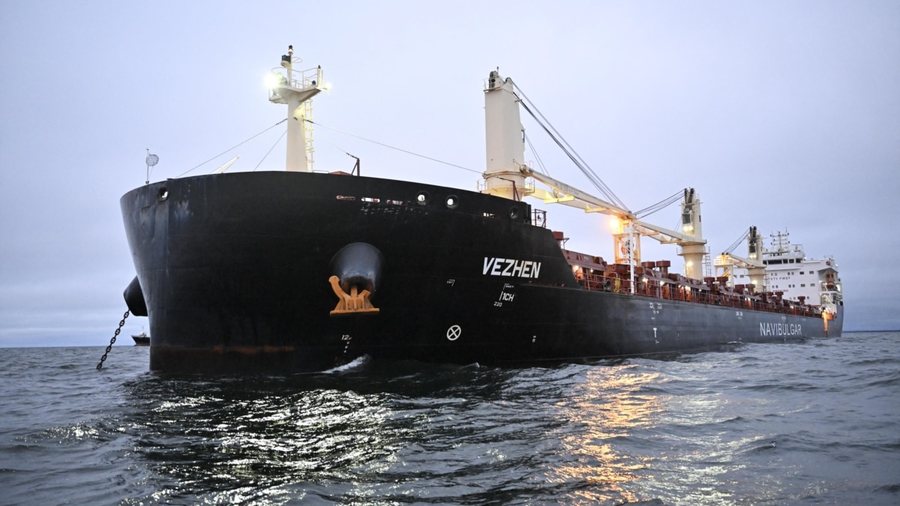
In light of the war in Ukraine, the Baltic Sea has been the scene of a number of incidents that have included damage to major power and communication lines.
In the latest incident, an undersea cable between Latvia and Sweden was damaged on January 26, amid suspicions that the incident was an act of sabotage, fueling fears of Russian interference and highlighting Moscow's so-called shadow fleet.
Swedish authorities boarded the Bulgarian-owned ship sailing from Russia and then launched an investigation into suspected sabotage of the vessel. Both Riga and Stockholm have said that damage to underwater communication cables was likely the result of external influence.
This incident follows several recent incidents where underwater pipelines and cables have been damaged by ships traveling to or from Russian ports.
In December, an oil tanker linked to Russia's shadow fleet allegedly damaged underwater communications off the coast of Finland after the tanker hit them with its anchor. A month earlier, a Chinese ship was involved in another incident. Another Chinese ship, sailing from Russia, also damaged a gas pipeline in the Baltic in October 2023.
While investigations are ongoing, these incidents have raised alarm among European governments that Moscow is targeting underwater infrastructure as part of its broader campaign of hybrid attacks.
"It's unlikely that you'll have four such incidents in a row," said Frank Juris, a researcher at the Tallinn-based Sinopsis Institute.
The latest incidents highlight rising tensions in the Baltic Sea since Russia launched a full-scale invasion of Ukraine in 2022.
After the cable damage in December, the European Union threatened new sanctions against Moscow and NATO launched a new patrol and surveillance operation.
The incident has been blamed on an oil tanker from Russia's shadow fleet, which consists of ships of unclear ownership carrying embargoed Russian oil products.
As international attention has focused on Russia's use of a shadow fleet to evade Western sanctions, the number of such vessels has grown and gone beyond tankers.
EU governments have warned of increasing maritime risks involving these Russian ships.
Earlier in January, an old ship loaded with 100,000 tons of oil, believed to be part of Russia's shadow fleet, was stranded off the northern coast of Germany.
At the time, German Foreign Minister Annalena Baerbock blamed Moscow and accused Russian President Vladimir Putin of evading sanctions and endangering European security "by deploying a fleet of rusty tankers."
NATO Secretary-General Mark Rutte said the new mission in the Baltics would include more patrols by aircraft, warships and drones. He said there was “reason for great concern” about damage to infrastructure, adding that NATO would respond by boarding and even seizing ships in possible future incidents.
German prosecutors are still investigating the explosion at the Nord Stream gas pipeline, which connected Russia to Germany. The explosion occurred in September 2022.
Swedish authorities have said they will work closely with Latvian counterparts to investigate possible sabotage, but who is behind these incidents is difficult to prove.
While Moscow's denials of responsibility for these incidents have been met with skepticism by European officials – German Interior Minister Boris Pistorius has called the November damage an act of sabotage and Finnish President Alexander Stubb said the December incident was linked to Russia – the investigations remain open.
Alexander Kalchev, chief executive of Navibulgar, the Bulgarian shipping giant that owns the vessel seized by Swedish authorities, said in a statement on January 27 that it was possible that the ship had damaged the cable, but denied that it was a deliberate act of sabotage. He said the ship had been caught in “extreme weather” and had dragged its anchor along the seabed.
The Chinese government offered a similar explanation when it notified Finland and Estonia almost a year after the October 2023 incident, which involved a Chinese ship damaging an underwater pipeline after dragging its anchor for several hundred nautical miles.
Most experts say that when a ship drops its anchor and drags it along the seabed for a long distance, such a fact would be noticed by the crew and they would change the ship's course.
"Draging the anchor for such a long time is unlikely to go unnoticed and to happen for a long time," Juris said.
EU states are expected to begin discussions on a new round of sanctions against Russia later this week. This would be the bloc's 16th package of sanctions against Russia since the start of the Russian invasion of Ukraine in 2022.
Two EU officials told Radio Free Europe that 20 to 30 new ships, believed to be part of Russia's shadow fleet, could be added to the sanctions list, which also includes other measures.
The EU has already sanctioned more than 70 ships suspected of being part of the shadow fleet. Meanwhile, the United States and Britain imposed new sanctions on January 10 against 180 ships believed to be part of this fleet./REL (A2 Televizion)











